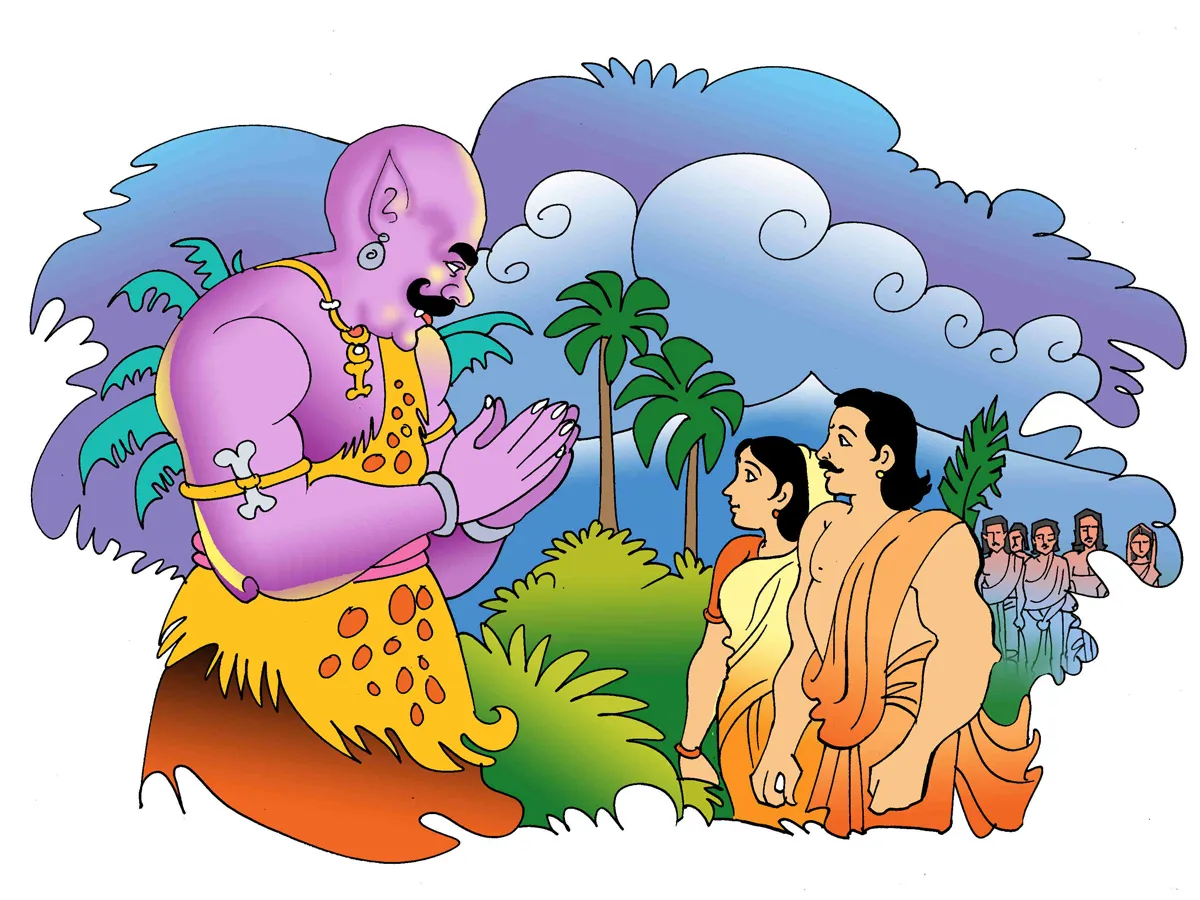When we think of warriors in the Mahabharata, names like Arjuna, Bhishma, and Karna immediately come to mind. But among these legends, there is one warrior who was unlike any other – Ghatotkacha. Born to Bhima and the Rakshasi princess Hidimba, Ghatotkacha was a warrior who blended supernatural powers with unwavering loyalty to Dharma.
Despite his Rakshasa (demon) lineage, he was a noble soul, guided by righteousness and duty. His role in the Kurukshetra war was not just crucial but also deeply symbolic, representing sacrifice for the greater good. His tragic yet heroic death remains one of the most significant turning points in the Mahabharata.
In this blog, we will explore the story of Ghatotkacha – from his birth and powers to his ultimate sacrifice and enduring legacy.
Birth and Early Life of Ghatotkacha
Ghatotkacha was born to Bhima and Hidimba during the Pandavas’ exile in the forests. Bhima had defeated Hidimba’s brother, Hidimb, in combat, and upon the insistence of his mother Kunti, he married Hidimba before leaving the forest.
Raised by his mother in the dense forests, Ghatotkacha grew up embracing both his Rakshasa heritage and the warrior ethics of his Kshatriya lineage. His name, meaning “bald-headed like a pot,” was given by Bhima due to his unique appearance.
From a young age, Ghatotkacha displayed extraordinary physical strength and supernatural abilities. He could fly, change his size at will, and summon mystical powers that made him nearly invincible. Despite his demon-like abilities, he was deeply devoted to his father and uncles, standing by them whenever they needed him.

Ghatotkacha – The Protector of the Pandavas
As Ghatotkacha grew, his reputation as a formidable warrior spread. When he first met the Pandavas, he immediately vowed his unwavering loyalty to them, especially to his father, Bhima.
His might was demonstrated in multiple battles where he effortlessly crushed enemy forces using his Rakshasa warfare techniques. Unlike human warriors, Rakshasas had the ability to fight fiercely at night, making Ghatotkacha a key asset in the war.
As the leader of the Rakshasa army, he brought an army of supernatural warriors to support the Pandavas, proving that his strength was not just personal but strategic. His character also challenged societal norms, proving that virtue and righteousness are not determined by one’s birth but by one’s actions.
The Kurukshetra War – Ghatotkacha’s Role and Ultimate Sacrifice
The Kurukshetra war saw Ghatotkacha emerging as one of the most fearsome warriors. He played a pivotal role, especially during the night battles, where his Rakshasa powers were at their peak. Using illusions, he confused and overwhelmed the Kaurava army, instilling fear even in their greatest warriors.
One of his most notable confrontations was against Karna. Karna, possessing the powerful Vasavi Shakti weapon, had been saving it for Arjuna. However, as Ghatotkacha wreaked havoc on the battlefield, Krishna saw an opportunity. He advised the Pandavas to push Ghatotkacha into an all-out assault against the Kauravas, forcing Karna to use his ultimate weapon against him.
In an act of supreme sacrifice, Ghatotkacha continued fighting with unmatched fury, ensuring Karna had no choice but to use the Vasavi Shakti on him. The moment the divine weapon struck, Ghatotkacha, in his final act, grew his body to an enormous size and fell onto the Kaurava army, crushing thousands of their soldiers in his death. His sacrifice saved Arjuna and changed the course of the war.
The Aftermath – The Impact of Ghatotkacha’s Death
The Pandavas were devastated by the loss of Ghatotkacha. For Bhima, it was the heartbreaking loss of a son who had stood by him in the darkest times. However, Krishna explained the deeper significance of Ghatotkacha’s sacrifice – by taking the Vasavi Shakti upon himself, he had ensured Arjuna’s survival, securing victory for the Pandavas.
On the Kaurava side, Karna felt deep regret. He realized that he had wasted his most powerful weapon on Ghatotkacha instead of saving it for Arjuna, which could have turned the tide of the war in the Kauravas’ favor.
Beyond the battlefield, Ghatotkacha’s life also challenged rigid societal labels. He was a Rakshasa by birth but stood as a beacon of virtue, loyalty, and courage. His story reminds us that righteousness is not bound by caste, birth, or appearance but by one’s actions and choices.
The Legacy of Ghatotkacha – Lessons for Today
Ghatotkacha’s story is more than just a tale of war; it offers profound lessons for modern times:
- Sacrifice for a Greater Cause: His willingness to lay down his life for his family and Dharma teaches us about selflessness and duty.
- The Power of Duality: He was both a Rakshasa and a noble warrior, showing us that identity is not rigid but shaped by choices and actions.
- Loyalty and Duty: He remained devoted to his father and the Pandava cause, demonstrating the importance of standing by one’s principles.
- Breaking Stereotypes: His story challenges the conventional idea of good and evil, proving that virtue is not tied to birth but to one’s deeds.
Today, Ghatotkacha’s lessons resonate with those who face struggles balancing different identities, responsibilities, and moral dilemmas. His story teaches us that true greatness lies in one’s actions, not in labels or lineage.
Ghatotkacha’s journey, from a Rakshasa prince to a hero of Dharma, is one of the most inspiring narratives in the Mahabharata. He was a warrior who embraced both his demon heritage and his human virtues, proving that one’s actions define their destiny. His supreme sacrifice not only ensured the Pandavas’ victory but also left a timeless lesson on duty, courage, and righteousness.
Even today, his story reminds us to embrace our unique strengths, make selfless choices, and stand for what is right, no matter the odds. Ghatotkacha may have perished in battle, but his legacy lives on, inspiring generations to fight for Dharma in their own lives.

